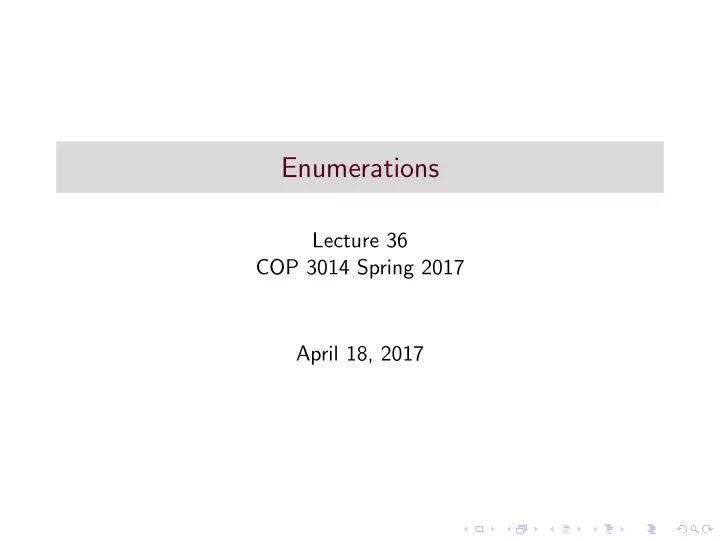

Enumerations Lecture 36 COP 3014 Spring 2017 April 18, 2017
User-defined types: There are several ways of defining new type names in C++. Here are some common ones: ◮ struct ◮ classes ◮ typedef ◮ enums Here, we focus on enumerations ◮ When you create an enumerated type, you are making up a new type that has a small set of specific values, which are listed in the declaration. ◮ The compiler will implement these internally as a set of integer constants. ◮ To create an enumeration, use the keyword enum , and the following syntax: enum enumName { list of enumeration constants } ;
Important advantages of enumerations ◮ Readability. ◮ A statement like { direction = NORTH; } is more intuitive to the reader than { direction = 1; } (in which the reader must memorize what the number 1 stands for. ◮ Error Checking (often not needed) ◮ In the Days enumeration above, there are only 7 possible values that a variable of type Days could take. Suppose such a variable is passed into a function. ◮ The function would not need to worry about whether this parameter had a valid day stored. There are only 7 possibilities, and all are valid. ◮ For contrast, think about a situation in which we pass in an integer, where 1 means Sunday, 2 means Monday, etc. What would happen if 10 were passed in? The function would have to error check to handle this.
Examples enum Names { RALPH, JOE, FRED } ; enum Direction { EAST, NORTH, WEST, SOUTH } ; ◮ Now, if you declare a variable of type Names, the symbols RALPH, JOE, and FRED are the actual values that can be used with these variables. ◮ Note, these words are NOT character strings. They are stored by the computer as constant values. ◮ Enumerations are essentially used for making code easier to read, and the values of certain variables easier to remember. Names who; // who is a variable of type Names Direction d; // d is a variable of type Direction who = FRED; // assign the value FRED to variable who if (who == FRED) cout << "Hi Fred";
Example char choice; cout << "Type in a direction (N)orth, (S)outh, (E)ast, (W)est: "; cin >> choice; switch(choice) { case ‘N’: d = NORTH; break; case ‘S’: d = SOUTH; break; case ‘E’: d = EAST; break; case ‘W’: d = WEST; break; } if (d == NORTH) cout << "Look out! There’s a polar bear!!";
Example enum Days SUN, MON, TUE, WED, THUR, FRI, SAT; Days today, tomorrow, yesterday; today = MON; if (today == SUN) yesterday = SAT; if (tomorrow == FRI) cout << "Today is Thursday!");
Recommend
More recommend